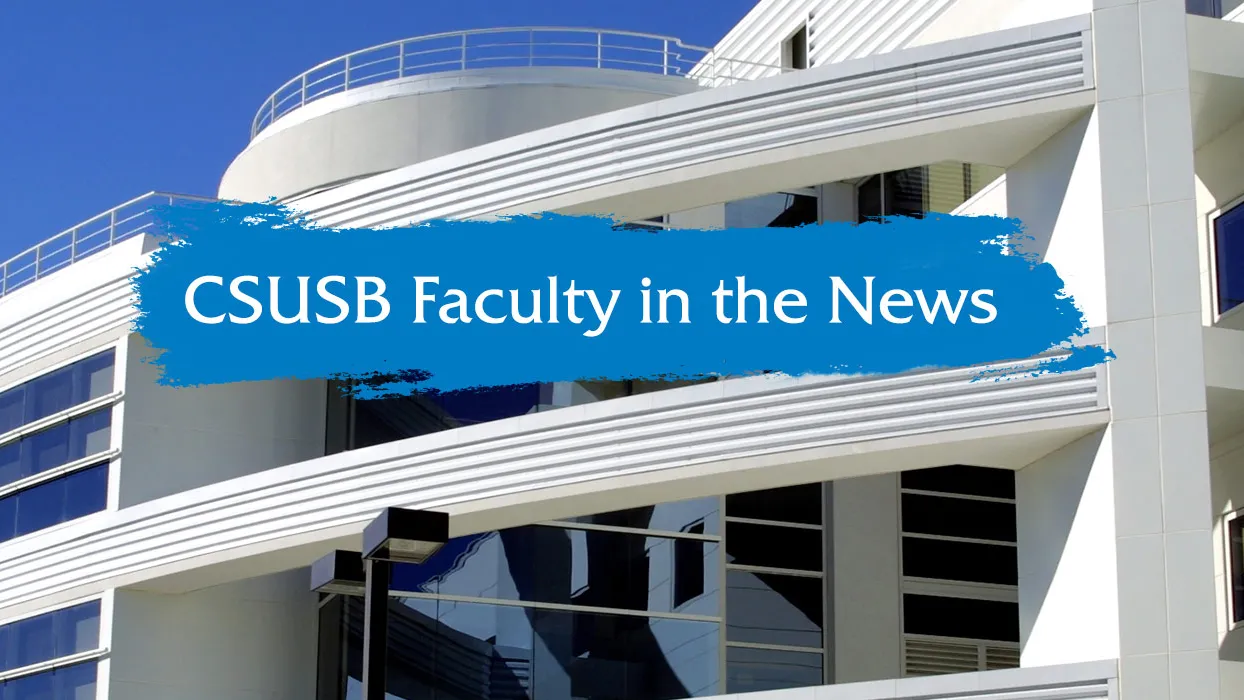NOTE: Faculty, if you are interviewed and quoted by news media, or if your work has been cited, and you have an online link to the article or video, please let us know. Contact us at news@csusb.edu.
Economic situation has improved for Inland Empire workers, but some companies still face labor shortages, CSUSB report says
Fontana Herald News
Sept. 6, 2021
As Labor Day is celebrated in the Inland Empire this week, a new report is indicating that the economic situation for workers has improved over the past year. However, some business owners are concerned because they have been unable to find enough laborers to fill vacant positions, according to the Inland Empire Report on Business for August.
Despite some discouraging signs, the Inland Empire manufacturing sector and overall economy “can be expected to continue its steady growth for at least the coming quarter,” said the authors of the survey, Barbara Sirotnik and Lori Aldana of the Institute of Applied Research at Cal State San Bernardino.
Read the complete article at “Economic situation has improved for Inland Empire workers, but some companies still face labor shortages, report says.”
CSUSB professor’s column on how the GOP fomented distrust of the news media cited in article
MSNBC
Sept. 9, 2021
An article by Meredith Conroy, CSUSB associate professor of political science, was cited in an opinion column by Zeeshan Aleem on how the former Trump administration devastated Republican trust in the media.
The article cited was published on the website FiveThirtyEight, “Why being ‘anti-media’ is now part of the GOP identity,” on April 5, 2021.
She wrote, in part, “Hostility and distrust of the news media … has become a point of political identity among Republicans. We see this especially in how people talk about politics online.”
Read the complete article at “How Trump devastated Republican trust in the media.”
CSUSB professor comments on latest development regarding multi-national agreement regarding Iran’s nuclear program
Press TV
Sept. 5, 2021
David Yaghoubian, CSUSB professor of history, was interviewed for a segment on Iran’s President Ebrahim Raeisi says the West is seeking to apply pressure during negotiations regarding the Joint Comprehensive Plan of Action (JCPOA), the multi-national agreement regulating Iran’s nuclear program. Raeisi said Iran is ready for negotiations but not under pressure, and that applying pressure has never been fruitful.
Yaghoubian said, “I think [Iran} also maintains leverage by sticking firmly to its convictions, to the letter of the JCPOA, to international law, and to multilateralism because this is where global politics and the international community are headed whether or not the U.S. empire and its minions are in agreement with this trajectory.”
Watch the segment at “Iran’s president: Iran ready for talks but not under pressure.”
CSUSB professor interviewed for article on how young Sikhs still struggle with post-Sept. 11 discrimination
Associated Press
Sept. 7, 2021
As the 20th anniversary of the Sept. 11 terrorist attacks nears, Brian Levin, director of CSUSB’s Center for the Study of Hate and Extremism, was included in the news service’s article examining how young Sikh Americans still struggle a generation later with the discrimination that 9/11 unleashed against their elders and them, ranging from school bullying to racial profiling to hate crimes — especially against males, who typically wear beards and turbans to demonstrate their faith.
The FBI listed 67 anti-Sikh crimes for 2020, the highest annual number since the category was created in 2015, said Levin. He said the center recently created a conflict advisory saying the risk of targeted aggression against Sikhs and others in the U.S. has been elevated to a near “severe” level. Political and international events could sporadically push those dangers even higher over the next 18 months, the advisory said.
Levin told the Committee on Homeland Security and Governmental Affairs on Aug. 5 that domestic extremism often follows “catalytic events” that provoke fear, such as the coronavirus outbreak, which sparked anti-Asian violence; the Jan. 6 insurrection at the U.S. Capitol; and the upcoming anniversary of Sept. 11.
Read the complete article “Young Sikhs still struggle with post-Sept. 11 discrimination.”
CSUSB professor discusses latest FBI hate crime report
Prism
Sept. 2, 2021
Brian Levin, criminal justice professor and director of the Center for the Study of Hate and Extremism at Cal State San Bernardino, was interviewed for an article about the latest FBI hate crime report, and how some say it doesn’t accurately reflect reality. For example, Ohio, with 11 million people, reported 34 hate crimes in 2020 because of a technical error.
Levin noted Ohio’s statistics as just one example of why the data is inaccurate. However, Levin sees the data as valuable because it reveals patterns. He said taken collectively, there’s plenty of information to determine trends and can even be used as a predictor.
“Hate crimes are correlated to catalytic events,” Levin said.
Read the complete article at “Why the FBI’s hate crime data can’t be trusted.”
CSUSB professor discusses latest FBI hate crime report
Indus News (Canada) via Scope host Waqar Rizvi
Sept. 7, 2021
CSUSB criminal justice professor Brian Levin, director of the Center for the Study of Hate and Extremism, was interviewed for the program Scope by host Waqar Rizvi about the latest FBI hate crime report, which indicated that such crimes hit a 12-year high in 2020. Levin discussed what factors contribute to such an increase.
Watch the segment on Rizvi’s Twitter feed at “Hate sells!”
These news clips and others may be viewed at “In the Headlines.”
